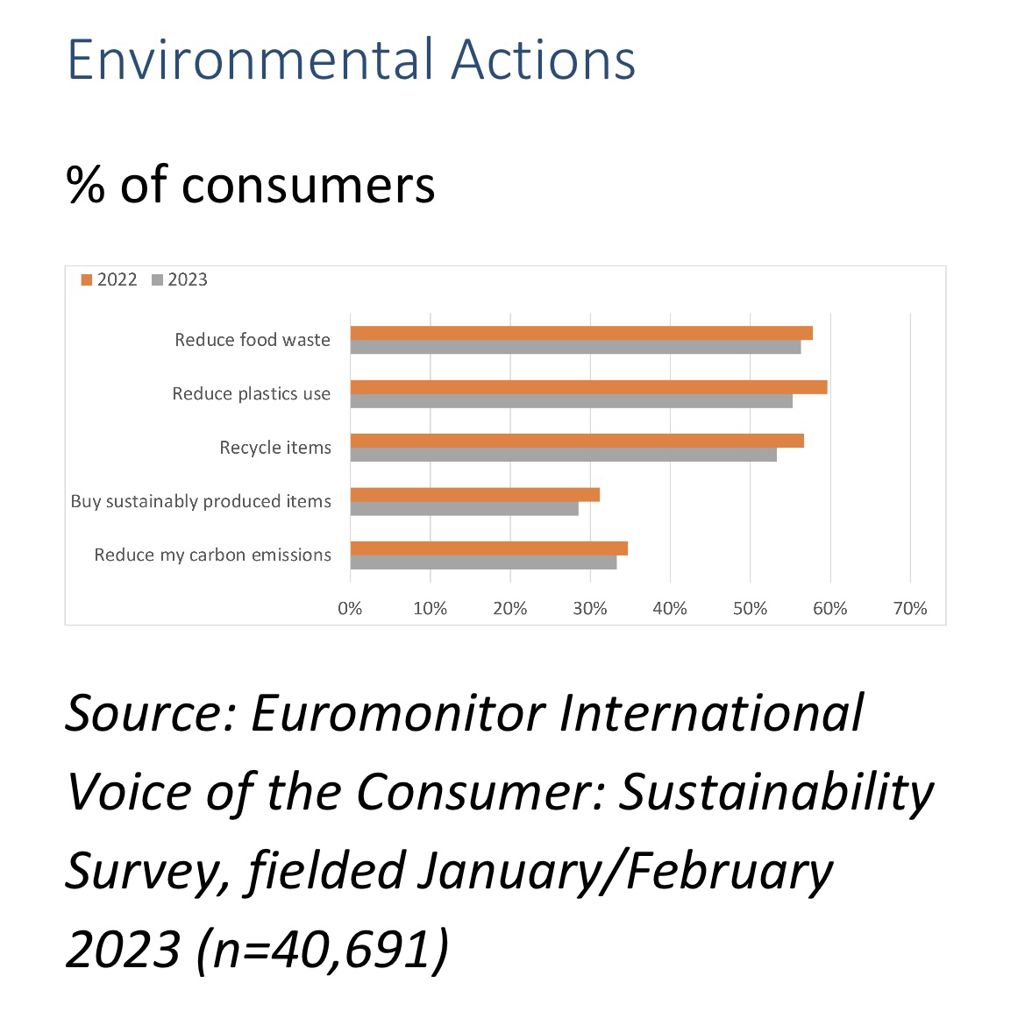- 64% of consumers try to have a positive impact on the environment through their everyday actions
- 45% of buyers felt they were personally contributing to climate change in 2023
- Burden is on companies and governments to ramp up efforts and help consumers clearly see how decisions influence positive change
- 45% of professionals said their companies plans to invest in certifications to avoid greenwashing in the next five years
LONDON, UK – Consumers are ‘greenwashed-out’ and forcefully pushing responsibility back on businesses to prove their eco pledges, reveals a Euromonitor expert.
Stephen Dutton, Client Insight Research Manager at Euromonitor International, said consumers were in a climate conundrum and do not think they can tackle the climate crisis alone. They have been taking steps to live sustainably but question whether companies and governments are using all possible resources to make a true difference.
“People are greenwashed out. They know their eco-friendly choices help to an extent but real change needs to be a collective effort. Consumers are pushing the responsibility back on businesses and won’t accept empty promises or false narratives. All organisations must take ownership of their carbon footprint and prove their positive impact.”
Ongoing climate catastrophes are leading to eco exhaustion
Dutton said that over the years consumers had made noticeable strides to protect the planet but climate catastrophes continued apace. Extreme weather events like intense wildfires, severe droughts and devastating floods are wreaking havoc on communities around the world. As temperatures continue to rise, so does consumer scepticism.
“Consumers realise that their individual contributions can only do so much. They are tuning out messages that place the burden on their behaviour. Instead, they want organisations to step up and show proof of their eco pledges.
Environmental concerns remain top of mind. Some 64% of consumers tried to have a positive impact on the environment through everyday actions while 45% felt they were personally contributing to climate change in 2023
“Some will keep making sustainable choices within their means, while others who feel discouraged might not make as much of an effort. Barriers like affordability and distrust are big challenges preventing further action, “added Dutton.
“The burden is shifting to companies and governments—not only to ramp up efforts but also help consumers clearly see how their decisions directly impact positive change.”

Businesses must be completely transparent and affordability is also a sticking point
Dutton said it is no secret that corporations have made misleading claims or underdelivered on sustainability initiatives for years. But people with green fatigue can see right through these deceptive antics.
“Emission reduction should be a focus area to cut through the noise. Offsetting isn’t enough but accurately mapping out your carbon footprint is complex. Businesses need to measure direct and indirect emissions, including upstream and downstream value chains. That’s not only challenging to track but also extensively regulated.
“The good news is that investing in long-term energy-efficient measures can be a cost-cutting strategy. Partnering with the right suppliers helps you avoid future penalties, and eco-friendly operations could have an immediate influence on your bottom line.
“Complete transparency is critical. You need to share concrete evidence of responsible business practices and validate progress. At the same time, demonstrate sustainable impact with specifics. If your product is made from recyclable materials, for example, put the amount of waste that was saved in production on the packaging. That way, shoppers immediately know how their purchase decision or behaviour makes a difference.”
Dutton said affordability was another sticking point especially in strained economic conditions. Sustainable items often carry a higher price point. Manufacturers need to democratise these options for shoppers.
Green tactics for companies in 2024
Dutton explained that 45% of professionals said their companies plans to invest in certifications to avoid greenwashing in the next five years.
“Businesses should develop strategic partnerships across their supply chain to reduce the carbon footprint and embrace the circular economy. Be forthright and factual and back-up claims with tangible proof and help your customers understand their impact.
“I would also recommend companies reinvest revenue or re-benchmark profit margins to manufacture products that are both affordable and sustainable.”
Stricter regulation is on the way
Governments are cracking down on corporate greenwashing. South Korea introduced a draft law that would fine companies for falsely advertising environmental impact and the EU issued legislation to prohibit the use of claims like climate-neutral and environmentally friendly without proper accreditation, said Dutton.
For further information see Euromonitor Global Consumer Trends here.
